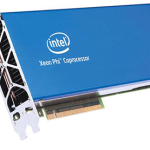“Native execution is good for application that are performing operations that map to parallelism either in threads or vectors. However, running natively on the coprocessor is not ideal when the application must do a lot of I/O or runs large parts of the application in a serial mode. Offloading has its own issues. Asynchronous allocation, copies, and the deallocation of data can be performed but it complex. Another challenge with offloading is that it requires memory blocking. Overall, it is important to understand the application, the workflow within the application and how to use the Intel Xeon Phi coprocessor most effectively.”
Video: Speeding Up Code with the Intel Distribution for Python
David Bolton from Slashdot shows how ‘embarrassingly parallel’ code can be sped up over 2000x (not percent) by utilizing Intel tools including the Intel Python compiler and OpenMP. “The Intel Distribution for Python* 2017 Beta program is now available. The Beta product adds new Python packages like scikit-learn, mpi4py, numba, conda, tbb (Python interfaces to Intel Threading Building Blocks) and pyDAAL (Python interfaces to Intel Data Analytics Acceleration Library). “
Using Vectors on Intel Xeon Phi
The use of vector instructions can speed up applications tremendously when used correctly. The benefit is that much more work can be done in a clock cycle than by performing the operation one at a time. The Intel Xeon Phi coprocessor was designed with strong support for vector level parallelism. “When these techniques are used either individually or in combination in different areas of the application, the performance will surely be increased, in many cases without a lot of effort.”
Video: Intel’s Machine Learning Strategy
In this video from the HPC User Forum in Tucson, Gary Paek from Intel presents: Intel’s Machine Learning Strategy. “Earlier this week, Intel announced the inception of the Intel Data Analytics Acceleration Library (Intel DAAL) open source project. Intel DAAL helps to speed up big data analysis by providing highly optimized algorithmic building blocks for all stages of data analytics (preprocessing, transformation, analysis, modeling, validation, and decision making) in batch, online, and distributed processing modes of computation.”
Intel DAAL Data Analytics Acceleration Library Moves to Open Source
Today Intel announced the inception of the Intel Data Analytics Acceleration Library (Intel DAAL) open source project. “Intel DAAL helps to speed up big data analysis by providing highly optimized algorithmic building blocks for all stages of data analytics (preprocessing, transformation, analysis, modeling, validation, and decision making) in batch, online, and distributed processing modes of computation. The open source project is licensed under Apache License 2.0.”







